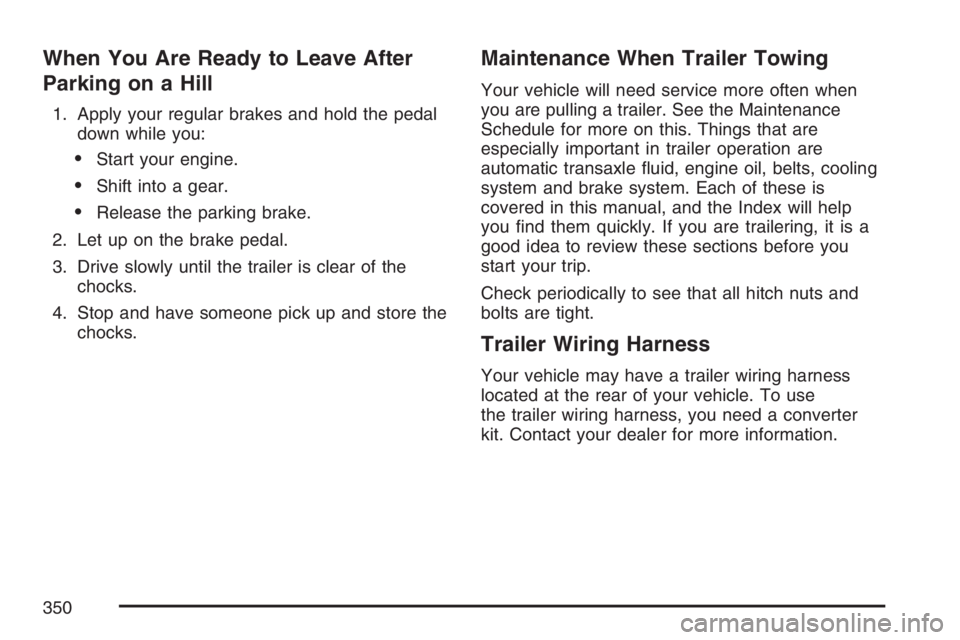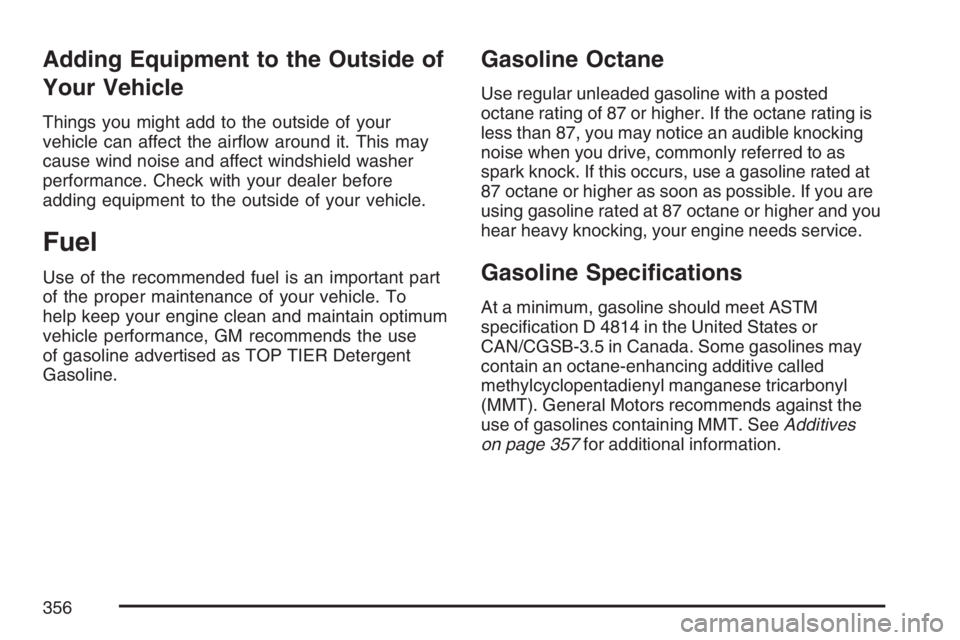Page 330 of 528
You can run the engine to keep warm, but be
careful.
{CAUTION:
Snow can trap exhaust gases under your
vehicle. This can cause deadly CO
(carbon monoxide) gas to get inside. CO
could overcome you and kill you. You
cannot see it or smell it, so you might not
know it is in your vehicle. Clear away
snow from around the base of your
vehicle, especially any that is blocking
your exhaust pipe. And check around
again from time to time to be sure snow
does not collect there.
Open a window just a little on the side of
the vehicle that is away from the wind.
This will help keep CO out.
Run your engine only as long as you must. This
saves fuel. When you run the engine, make it go a
little faster than just idle. That is, push the
accelerator slightly. This uses less fuel for the
heat that you get and it keeps the battery charged.
330
Page 340 of 528

Towing a Trailer
{CAUTION:
If you do not use the correct equipment
and drive properly, you can lose control
when you pull a trailer. For example, if the
trailer is too heavy, the brakes may not
work well — or even at all. You and your
passengers could be seriously injured.
Pull a trailer only if you have followed all
the steps in this section. Ask your dealer
for advice and information about towing a
trailer with your vehicle.
Notice:Pulling a trailer improperly can
damage your vehicle and result in costly
repairs that would not be covered by your
warranty. Always follow the instructions in this
section and check with your dealer for more
information about towing a trailer with
your vehicle.Your vehicle can tow a trailer. To identify the
trailering capacity of your vehicle, you should read
the information in “Weight of the Trailer” that
appears later in this section. Trailering is different
than just driving your vehicle by itself. Trailering
means changes in handling, acceleration, braking,
durability, and fuel economy. Successful, safe
trailering takes correct equipment, and it has to be
used properly.
That is the reason for this section. In it are many
time-tested, important trailering tips and safety
rules. Many of these are important for your safety
and that of your passengers. So please read
this section carefully before you pull a trailer.
Load-pulling components such as the engine,
transaxle, wheel assemblies and tires are forced
to work harder against the drag of the added
weight. The engine is required to operate
at relatively higher speeds and under greater
loads, generating extra heat. The trailer also adds
considerably to wind resistance, increasing the
pulling requirements.
340
Page 350 of 528

When You Are Ready to Leave After
Parking on a Hill
1. Apply your regular brakes and hold the pedal
down while you:
Start your engine.
Shift into a gear.
Release the parking brake.
2. Let up on the brake pedal.
3. Drive slowly until the trailer is clear of the
chocks.
4. Stop and have someone pick up and store the
chocks.
Maintenance When Trailer Towing
Your vehicle will need service more often when
you are pulling a trailer. See the Maintenance
Schedule for more on this. Things that are
especially important in trailer operation are
automatic transaxle �uid, engine oil, belts, cooling
system and brake system. Each of these is
covered in this manual, and the Index will help
you �nd them quickly. If you are trailering, it is a
good idea to review these sections before you
start your trip.
Check periodically to see that all hitch nuts and
bolts are tight.
Trailer Wiring Harness
Your vehicle may have a trailer wiring harness
located at the rear of your vehicle. To use
the trailer wiring harness, you need a converter
kit. Contact your dealer for more information.
350
Page 351 of 528

Service........................................................ 354
Accessories and Modi�cations................... 354
California Proposition 65 Warning.............. 355
Doing Your Own Service Work.................. 355
Adding Equipment to the Outside of Your
Vehicle................................................... 356
Fuel............................................................. 356
Gasoline Octane........................................ 356
Gasoline Speci�cations.............................. 356
California Fuel........................................... 357
Additives................................................... 357
Fuels in Foreign Countries........................ 358
Filling the Tank......................................... 359
Filling a Portable Fuel Container............... 361
Checking Things Under the Hood.............. 362
Hood Release........................................... 363
Engine Compartment Overview.................. 364
Engine Oil................................................. 365
Engine Oil Life System.............................. 368
Engine Air Cleaner/Filter............................ 370Automatic Transaxle Fluid......................... 372
Engine Coolant.......................................... 375
Radiator Pressure Cap.............................. 378
Engine Overheating................................... 378
Overheated Engine Protection
Operating Mode..................................... 380
Cooling System......................................... 381
Power Steering Fluid ................................. 387
Windshield Washer Fluid........................... 388
Brakes...................................................... 389
Battery...................................................... 393
Jump Starting............................................ 394
Bulb Replacement....................................... 399
Halogen Bulbs........................................... 399
Headlamps, Front Turn Signal,
Sidemarker, and Parking Lamps............. 399
Taillamps, Turn Signal, and Stoplamps...... 401
Taillamps and Back-Up Lamps.................. 402
Replacement Bulbs................................... 404
Windshield Replacement............................ 404
Section 5 Service and Appearance Care
351
Page 356 of 528

Adding Equipment to the Outside of
Your Vehicle
Things you might add to the outside of your
vehicle can affect the air�ow around it. This may
cause wind noise and affect windshield washer
performance. Check with your dealer before
adding equipment to the outside of your vehicle.
Fuel
Use of the recommended fuel is an important part
of the proper maintenance of your vehicle. To
help keep your engine clean and maintain optimum
vehicle performance, GM recommends the use
of gasoline advertised as TOP TIER Detergent
Gasoline.
Gasoline Octane
Use regular unleaded gasoline with a posted
octane rating of 87 or higher. If the octane rating is
less than 87, you may notice an audible knocking
noise when you drive, commonly referred to as
spark knock. If this occurs, use a gasoline rated at
87 octane or higher as soon as possible. If you are
using gasoline rated at 87 octane or higher and you
hear heavy knocking, your engine needs service.
Gasoline Speci�cations
At a minimum, gasoline should meet ASTM
speci�cation D 4814 in the United States or
CAN/CGSB-3.5 in Canada. Some gasolines may
contain an octane-enhancing additive called
methylcyclopentadienyl manganese tricarbonyl
(MMT). General Motors recommends against the
use of gasolines containing MMT. SeeAdditives
on page 357for additional information.
356
Page 357 of 528

California Fuel
If your vehicle is certi�ed to meet California
Emissions Standards, it is designed to operate on
fuels that meet California speci�cations. See the
underhood emission control label. If this fuel is not
available in states adopting California emissions
standards, your vehicle will operate satisfactorily on
fuels meeting federal speci�cations, but emission
control system performance may be affected. The
malfunction indicator lamp may turn on and your
vehicle may fail a smog-check test. SeeMalfunction
Indicator Lamp on page 222. If this occurs, return to
your authorized GM dealer for diagnosis. If it is
determined that the condition is caused by the type
of fuel used, repairs may not be covered by your
warranty.
Additives
To provide cleaner air, all gasolines in the United
States are now required to contain additives that
will help prevent engine and fuel system deposits
from forming, allowing your emission control system
to work properly. In most cases, you should not
have to add anything to your fuel. However, some
gasolines contain only the minimum amount of
additive required to meet U.S. Environmental
Protection Agency regulations. To help keep fuel
injectors and intake valves clean, or if your vehicle
experiences problems due to dirty injectors or
valves, look for gasoline that is advertised as TOP
TIER Detergent Gasoline. Also, your GM dealer
has additives that will help correct and prevent
most deposit-related problems.
357
Page 362 of 528
Checking Things Under
the Hood
{CAUTION:
An electric fan under the hood can start up
and injure you even when the engine is not
running. Keep hands, clothing, and tools
away from any underhood electric fan.
{CAUTION:
Things that burn can get on hot engine
parts and start a �re. These include
liquids like fuel, oil, coolant, brake �uid,
windshield washer and other �uids, and
plastic or rubber. You or others could be
burned. Be careful not to drop or spill
things that will burn onto a hot engine.
362
Page 365 of 528

A. Underhood Fuse Block. SeeUnderhood Fuse
Block on page 466.
B. Remote Positive (+) Terminal. SeeJump
Starting on page 394.
C. Windshield Washer Fluid Reservoir. See
“Adding Washer Fluid” underWindshield
Washer Fluid on page 388.
D. Radiator Pressure Cap. SeeRadiator Pressure
Cap on page 378.
E. Power Steering Fluid Reservoir. SeePower
Steering Fluid on page 387.
F. Engine Oil Fill Cap. See “When to Add Engine
Oil” underEngine Oil on page 365.
G. Engine Oil Dipstick. See “Checking Engine Oil”
underEngine Oil on page 365.
H. Automatic Transaxle Fluid Dipstick. See
“Checking the Fluid Level” underAutomatic
Transaxle Fluid on page 372.
I. Brake Master Cylinder Reservoir. See “Brake
Fluid” underBrakes on page 389.
J. Engine Air Cleaner/Filter. SeeEngine Air
Cleaner/Filter on page 370.
K. Engine Coolant Recovery Tank. SeeCooling
System on page 381.Engine Oil
Checking Engine Oil
It is a good idea to check the engine oil every time
you get fuel. In order to get an accurate reading,
the oil must be warm and the vehicle must be
on level ground.
The engine oil dipstick handle is a yellow loop.
SeeEngine Compartment Overview on page 364
for the location of the engine oil dipstick.
1. Turn off the engine and give the oil several
minutes to drain back into the oil pan. If you
do not do this, the oil dipstick might not
show the actual level.
2. Pull out the dipstick and clean it with a paper
towel or cloth, then push it back in all the
way. Remove it again, keeping the tip down,
and check the level.
365